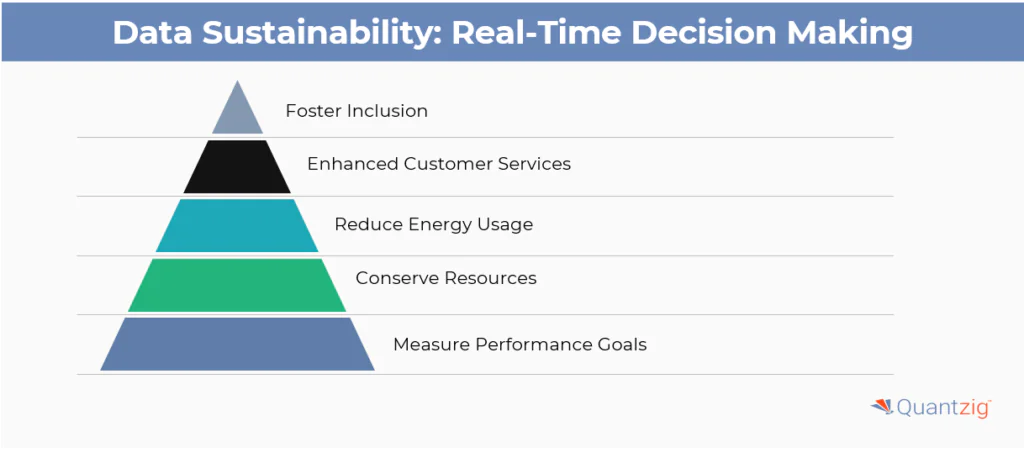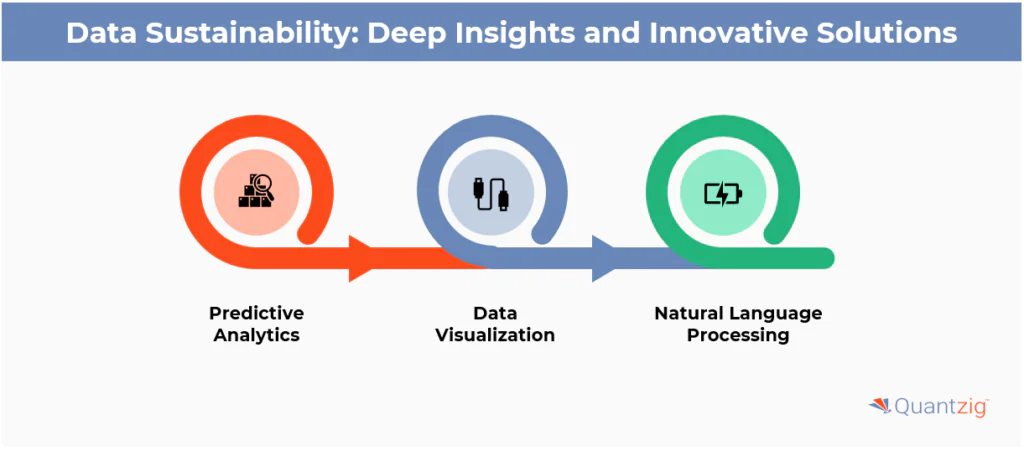Written by: Associate Vice President, Analytics and Data Strategy, Quantzig.
Table of Contents
Key Takeaways:
- Data-driven sustainability is a critical component of an organization’s sustainability strategy, enabling informed decision-making and effective resource allocation.
- The four types of sustainability – environmental, social, economic, and governance – are interconnected and interdependent, requiring a holistic approach to achieve true sustainability.
- The three main areas of sustainability – environmental, social, and governance – are essential for organizations to prioritize, as they have a direct impact on the organization’s long-term success and reputation.
- Quantzig’s data sustainability solutions leverage advanced analytics, AI, and blockchain technologies to provide real-time insights and actionable recommendations, enabling organizations to achieve their sustainability goals and stay ahead of regulatory standards.
Introduction to sustainable data management
Data sustainability is a critical component of any organization’s sustainability strategy. By leveraging data analytics and insights, companies can measure and manage their environmental and social impact, making strategic decisions that drive positive change. In this blog, we will explore the importance of data sustainability, the challenges associated with implementing sustainable data management practices, and the benefits of using data analytics to drive sustainability initiatives.
Book a demo to experience the meaningful insights we derive from data through our analytical tools and platform capabilities. Schedule a demo today!
Request a Free DemoData: The Foundation of Sustainability
Data is the foundation of sustainability. It provides the necessary insights to measure and manage an organization’s environmental and social impact, enabling strategic decision-making and effective resource allocation. Data sustainability is essential for companies to achieve their sustainability goals and demonstrate their commitment to environmental and social responsibility.
The Role of ESG in Data Sustainability
| Aspect | Role of ESG in Data Sustainability |
|---|---|
| Environmental Impact | Helps measure and reduce carbon footprints, energy consumption, and resource usage. |
| Social Responsibility | Tracks labor practices, community engagement, and employee well-being to enhance social impact. |
| Governance | Ensures transparency, regulatory compliance, and ethical business practices in sustainability efforts. |
| Performance Monitoring | Enables organizations to evaluate and improve sustainability initiatives through ESG metrics. |
| Long-term Value | Drives sustainable growth by aligning business strategies with environmental and societal goals. |
data and sustainability: The Environmental Impact of Traditional Data Management Practices
Traditional data management practices have a significant environmental impact. The production, storage, and disposal of data generate substantial greenhouse gas emissions, contribute to e-waste, and consume large amounts of energy. For example, the data center industry alone is responsible for approximately 1% of global greenhouse gas emissions. Moreover, the disposal of outdated or obsolete data storage devices contributes to e-waste, which is a significant environmental concern.
As data management experts, we have observed that traditional practices often lead to inefficiencies and wastage. Here are three common observations that highlight the need for a more optimized approach:
| Issue | Impact |
|---|---|
| Data Silos | Isolated data causes redundant tasks, wasted time, effort, and duplicated data across systems. |
| One-Size-Fits-All Approach | Inefficient tool selection leads to performance lags and resource contention in data management. |
| Lack of Data Governance | Unorganized data and duplication result in wasted resources, manual work, and inaccurate metrics. |
Traditional data management practices often lead to inefficiencies and wastage. By adopting a more optimized approach, organizations can reduce resource wastage, improve efficiency, and enhance overall data management. This includes breaking down data silos, choosing specialized tools for specific use-cases, and implementing robust data governance practices.
Quantzig Case Study: Farm Tech Solution for Frozen Food Manufacturer
Quantzig recently worked with a frozen food manufacturer that procures farm produce directly. The company was using a manual process to ensure the chemicals used and avoidance of permanent soil degradation, which was cost and resource-intensive as well as less effective. We created a farm tech solution comprising of a model analysing different types of soil, farming practices, and varieties of vegetables to calculate ideal chemicals to be used, their combination, and dosage for a given soil and vegetable variety. The model was then made into a simulator for anyone to feed information to ensure compliance against environmental impact norms. Finally, we created an app that can be exposed outside the client network for self-compliance by farmers directly.
| Attribute | Details |
|---|---|
| Client Location | Canada |
| Client | Frozen food manufacturer procuring farm produce directly |
| Challenge | The manual process of ensuring chemical use and avoiding permanent soil degradation was cost-intensive, resource-intensive, and less effective. |
| Solution | Quantzig developed a farm tech solution, including a model analyzing soil types, farming practices, and vegetable varieties to calculate the ideal chemicals, their combinations, and dosages. This model was turned into a simulator for compliance with environmental impact norms and an app for farmer self-compliance. |
| Impact Delivered | Streamlined the environmental impact assessment, automated the compliance process, and reduced the audit and compliance process from one month to 5 business days. |
Challenges Faced by the Client:
Client is frozen food manufactured procuring farm produce directly. The manual way ensuring the chemicals used and avoidance of permanent soil degradation was cost & resource intensive as well as less effective.
Custom Solutions provided by Quantzig:
Quantzig created a farm tech solution comprising of a model analysing different types of soil, farming practice and varieties of vegetables to calculcate ideal chemicals to be used, their combination and dosage for a given soil and vegetable variety. Then the model was made into a simulator for anyone to feed informance to ensure compliance against the environment impact norms. Finally, Quantzig created an app that can be exposed outside client network for a self compliance by farmers directly.
Impact Brought using Quantzig’s Expert Solutions:
- Streamlined the entire environmental impact assessment and automated the compliance process for a self serve awareness and execution.
- Reduced the audit & compliance process to 5 business days from initial one month.
At Quantzig, we believe that a robust data strategy and data architecture are the foundations for achieving data-driven sustainability and sustainable business practices. Our team of experts works closely with clients to develop a data-driven framework that enables them to collect, analyze, and leverage sustainability data to make informed decisions. We offer cost-effective solutions that streamline data transfer and storage, ensuring that organizations can access and utilize their data efficiently. By integrating AI and advanced analytics into our data strategy, we help clients identify areas for improvement, optimize resource allocation, and drive positive change. Our approach to data-driven sustainability is tailored to each client’s unique needs, ensuring that they can achieve their sustainability goals while maintaining a competitive edge in the market.
Experience the advantages firsthand by testing a customized complimentary pilot designed to address your specific requirements. Pilot studies are non-committal in nature.
Request a free pilotData science for sustainability: Understanding Sustainable Data Management
Sustainable data management involves the responsible collection, storage, and disposal of data. It includes practices such as data minimization, data anonymization, and data archiving to reduce the environmental impact of data management. Additionally, sustainable data management involves the use of renewable energy sources, energy-efficient data centers, and data storage devices that minimize e-waste.
Data is the cornerstone of sustainability, providing the foundation for strategic decision-making and driving positive change. By leveraging data and sustainability analytics, enterprises can build resilience and achieve their sustainability goals.
Automated Data Collection and Analysis: Enabling Real-Time Decision-Making
Automated data collection and analysis empower enterprises to make informed, real-time decisions that support sustainability initiatives. This includes identifying opportunities to:
- Enhance Customer Services: Analyzing customer data to better understand their needs and preferences, leading to improved customer experiences and loyalty.
- Foster Equality, Diversity, and Inclusion: Using data to identify and address biases, ensuring equal opportunities and promoting diversity and inclusion within the organization.
- Reduce Energy Usage and Cut Carbon Emissions: Analyzing energy consumption patterns to optimize energy usage and reduce carbon emissions, contributing to a more sustainable future.
- Conserve Resources and Minimize Waste: Identifying areas of inefficiency and waste, enabling the implementation of sustainable practices and reducing environmental impact.
- Measure Performance Toward Sustainability Goals: Tracking progress toward sustainability goals, enabling data-driven decision-making and continuous improvement.
Advanced Technologies: Unlocking Deep Insights and Innovative Solutions
Advanced technologies, such as machine learning and artificial intelligence, can uncover deep insights from data, opening new avenues for innovative solutions that support sustainable practices. This includes:
- Predictive Analytics: Using data to predict and prevent environmental and social impacts, enabling proactive measures to mitigate these effects.
- Data Visualization: Presenting complex data in an intuitive and accessible format, facilitating better understanding and decision-making.
- Natural Language Processing: Analyzing unstructured data, such as text and social media, to identify trends and sentiment, and inform sustainability strategies.
Data is the foundation of sustainability, enabling enterprises to make strategic, real-time decisions that drive positive change. By leveraging data and sustainability analytics, organizations can build resilience, achieve sustainability goals, and contribute to a more sustainable future.
sustainable data: Benefits of Data Sustainability
The benefits of data sustainability include:
- Measurable Progress: Quantifies the environmental and social impact of sustainability efforts, demonstrating progress and effectiveness.
- Strategic Decision-Making: Data-driven insights guide strategic investments in sustainable practices and technologies.
- Improved Efficiency: Helps identify areas to optimize resource usage, minimize waste, and reduce the environmental footprint.
- Transparency and Credibility: Enables transparent reporting on sustainability performance, building trust with stakeholders.
- Risk Management: Helps identify and mitigate environmental and social risks associated with the organization’s operations.
- Innovation and Opportunity: Uncovers new opportunities for innovation in sustainable practices, product development, and business models.
Quantzig’s Tech Stack for Sustainability
As companies strive to reduce their environmental footprint and promote social responsibility, they need to leverage the right tools and technologies to measure and manage their sustainability performance. At Quantzig, we understand the importance of sustainability and have developed a comprehensive tech stack that enables organizations to track, analyse, and report on their sustainability initiatives. Our tech stack for sustainability includes a range of cutting-edge tools and platforms that help organizations make data-driven decisions and drive positive change.
The tech stack for sustainability includes:
- PowerBI: A business analytics service by Microsoft that provides interactive visualizations and business intelligence capabilities. PowerBI enables organizations to create data visualizations and reports that provide insights into their sustainability performance.
- Power Apps: A low-code development platform by Microsoft that enables users to build custom applications. Power Apps can be used to create applications that support sustainability initiatives, such as tracking and reporting on environmental impact.
- Power Automate: A workflow automation platform by Microsoft that automates repetitive tasks and processes. Power Automate can be used to automate sustainability-related tasks, such as data collection and reporting.
- SQL: A relational database management system that manages and manipulates data. SQL is used to store and manage large datasets, enabling organizations to analyze and report on their sustainability performance.
- Python: A programming language widely used for data analysis and machine learning. Python can be used to develop custom data analytics tools and models that support sustainability initiatives.
- Data Bricks: An open-source data processing framework that enables scalable data processing. Data Bricks can be used to process large datasets and perform complex data analytics tasks.
- SAP: A software company that provides enterprise resource planning and customer relationship management solutions. SAP can be used to manage and analyze sustainability-related data, enabling organizations to make informed decisions.
Quantzig’s tech stack for sustainability is designed to help organizations achieve their sustainability goals by providing a comprehensive set of tools and platforms that enable data-driven decision-making. From data visualization and reporting to workflow automation and data analytics, our tech stack offers a range of solutions that can be tailored to meet the unique needs of each organization. By leveraging our tech stack, organizations can gain valuable insights into their sustainability performance, identify areas for improvement, and make informed decisions that drive positive change. Whether you are looking to reduce your environmental impact, promote social responsibility, or improve your overall sustainability performance, our tech stack is the perfect solution for you.
Get started with your complimentary trial today and delve into our platform without any obligations. Explore our wide range of customized, consumption driven analytical solutions services built across the analytical maturity levels.
Start your free trialConclusion
A robust data architecture is key for cost-effective solutions and sustainable practices. Efficient data transfer and AI integration enable informed decision-making and competitive edge.
Data sustainability supports achieving sustainability goals and demonstrates commitment to environmental and social responsibility. Quantzig specializes in helping businesses reach these goals through expert data sustainability and analytics.





